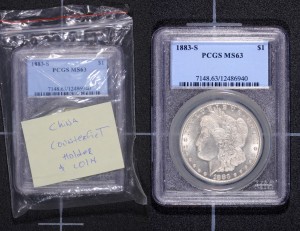I attended the event sponsored by the Gold and Silver Political Action Committee (GSPAC) on June 27, 2012 to lobby them for passage of the Collectible Coin Protection Act (H.R. 5977) introduced last month by Rep. Fred Upton (R-MI), Chairman of the U.S. House Energy and Commerce Committee, and Lamar Smith (R-TX), Chairman of the U.S. House Judiciary Committee. This is a bill that everyone in the numismatic committee should support and ask their member of congress to support.
For now, I will let the folks at PCGS tell you their experiences at the event (their press release follows). I will follow up at some point with my own thoughts and commentary on the topic. Also, while the press release has one picture, there are three more that I posted to Pinterest that I think are more interesting, including a Morgan Dollar that was cut in half to marry a specific date with a mintmark that was placed in an altered PCGS holder and sent to PCGS for verification. It is fascinating what some people will do and what they get away with.
PCGS Gives Congressmen A Close Look At Counterfeiting Problems
(Washington, DC) – During June 27, 2012 meetings with numismatic leaders in Washington, DC, influential U.S. Congressmen and congressional staff members learned about rare coin authentication and were shown examples of counterfeit coins from the Professional Coin Grading Service (www.PCGS.com) reference collection and examples of counterfeit PCGS encapsulation holders. PCGS has detected over 5,500 counterfeit coins submitted in the last 12 months, a higher number by far than in any previous 12-month period.

PCGS representatives showed Congressmen counterfeit U.S. coins in counterfeit PCGS holders during their recent meetings in Washington, DC. (Photo courtesy of PCGS.)
Vartian met with Rep. Fred Upton (R-Michigan), Chairman of the U.S. House Energy and Commerce Committee, Lloyd Doggett (D-Texas), a member of the House Ways and Means Committee and staff members for other Congressmen including Howard Berman (D-California), the second ranking Democrat on the House Judiciary Committee.
“It was a very successful series of meetings. The Congressmen and staff members focused on the items we brought; actual counterfeit coins and counterfeit holders, and heard about the on-going efforts by PCGS to combat dealers who sell fake coins and holders. We also talked about educating collectors and dealers. But now the numismatic community must come together and urge other members of Congress to support and approve changes to the law.”
Those proposed changes are in HR5977, the Collectible Coin Protection Act of 2012, a bill that would amend and significantly strengthen the Hobby Protection Act of 1973. The Washington meetings were aimed at educating members of Congress about the counterfeiting problems and the need for stronger laws.
“Every collector, every dealer, should personally contact their Congressional representatives now and specifically request they support HR5977,” Vartian emphasized.
“There are several very positive elements in the bill (HR5977) for PCGS and for all collectors and dealers who buy and sell PCGS-certified coins. One provision provides for triple damages for counterfeiting third-party holders such as the patented, sonically-sealed PCGS tamper-evident holders,” said Don Willis, PCGS President.
HR5977 was introduced on June 20 by Congressman Lamar Smith (R-Texas), Chairman of the U.S. House Judiciary Committee, and co-sponsored by Congressman Upton.
The Washington meetings were organized by the Gold & Silver Political Action Committee. In addition to PCGS, representatives of the Industry Council for Tangible Assets (ICTA), the Professional Numismatists Guild (PNG) and Numismatic Guaranty Corporation (NGC) also attended along with former Louisiana Congressman Jimmy Hayes, a long-time collector.
The Hobby Protection Act, first enacted in 1973 and amended in 1988, requires manufacturers and importers of imitation numismatic items to mark them plainly and permanently with the word, “COPY.” The Collectible Coin Protection Act would expand and strengthen the consumer protections to provide remedies against sellers of such items and others who substantially assist them. It also would increase penalties for fake coins fraudulently sold inside counterfeit grading service holders.
Barry Stuppler, Chairman of the Gold & Silver PAC, said if approved by Congress and signed into law by the President the new law would:
- Include not only the distribution but also the sale in commerce of prohibited items;
- Add a provision expanding the Hobby Protection Act to include “any person who provides substantial assistance or support to any manufacturer, importer, or seller” knowingly engaging in any act or practice that violates the Act;
- Expand the venue for legal action to include not just having an agent present, to include “transacts business” — or wherever venue is proper under section 1391 of Title 28, United States Code;” — and
- Add a section on Trademark violations specifically written to include the certification services and adds remedies to the Hobby Protection Act that currently exist under the Trademark Act of 1946 (U.S.C. Title 15, Sections 1116-1118) for violations of the Hobby Protection Act.
In a statement prior to the meetings, Willis stated: “Chinese counterfeiting is the most serious challenge faced not only by the collectibles markets and brand name products, but also by the United States Treasury. Entire industries have sprung up in China to manufacture virtually anything made in America including U.S. Government issued coins. These factories and industries operate in the open and with the full support of the Chinese government. By its lack of action to stop the activities, the Chinese government endorses the counterfeiting of U.S. coins.”
“Even worse, Customs and the U.S. Government do little to stop counterfeits from entering the U.S. Once in the US little effort is made to arrest and prosecute individuals selling counterfeit material. Consequently the U.S. has been flooded with counterfeit products, including coins, resulting in the loss of billions of dollars in revenue each year,&rdquo Willis explained.

